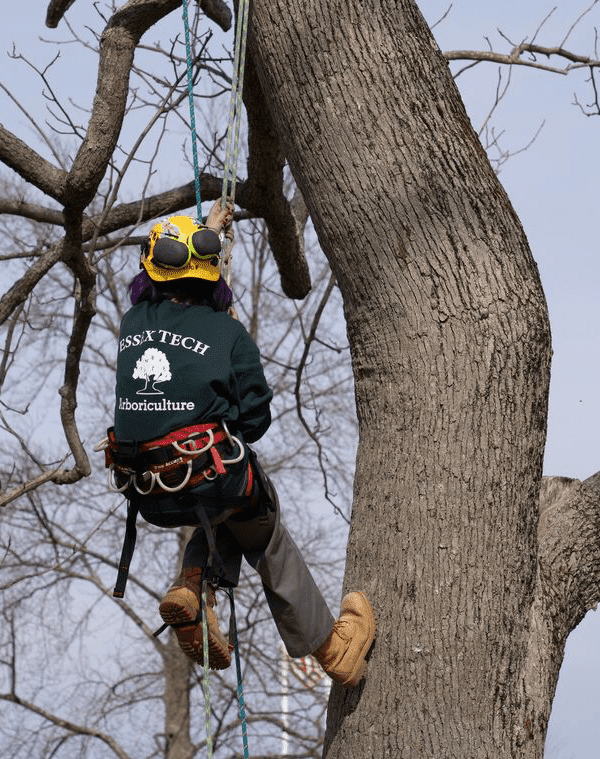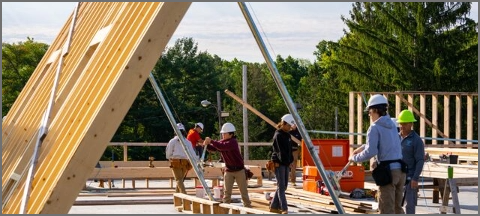Plant Sciences
Arboriculture
About This Program
Arboriculture is the cultivation, management, and study of individual trees, shrubs, vines, and other perennial woody plants. More than 80% of people in the United States live in areas filled with trees, and planting trees in all settings is increasing. As this trend continues, arborists and urban foresters strive to preserve trees in urban and suburban areas. In this program, students learn how arborists and urban foresters ensure healthy populations of trees to provide sustained benefits to people, including the removal and replacement of hazardous trees. Students are prepared for the following certifications: Massachusetts Pesticide License, ISA-Certified Tree Climbing Professional, and ISAAerial Lift Professional. See below for full course description.

Career Paths
- Commercial or Municipal Arborist
- Plant Health Care Technician
- Urban Forester Salesperson
- Small Engine Mechanic
- Tree Worker
- Landscaper
- Nursery Worker
Industry Partnerships
- International Society of Arboriculture, New England Chapter
- Cicoria Tree Service
- Endicott Park, Town of Danvers
Certifications
- OSHA 10 Hour Construction
- Safe Tree Worker
- Massachusetts Pesticide License
- ISA Certified Tree Climbing Professional ISA Aerial Lift Professional
- Aerial Rescue First Aid
Advisory Committee Members
- Michael Bonner, Iron Tree
- Ken Brown, Mayer Tree Service
- Caitlin Daly
- Meghan Daly
- Logan Gilliland, Mayer Tree Service
- Tim Lecuivre, Town of Arlington
- John Maestranzi, Iron Tree
- Derek Maribito, Maribito Tree Service
- Jake Maynard, Bartlett Tree Experts
- Dave Morin, Town of Danvers-Public Works
- Matt Natti, Cape Ann Tree Service
- Anthony Rainone, Mayer Power Products
- Paul Taylor, Marquis Tree Service
- Jonathan Webb, Mt. Auburn Cemetery
Meeting Documents
- Arboriculture – Fall 2017 PAC Meeting Minutes
- Arboriculture – Spring 2018 PAC Meeting Minutes
- Arboriculture Fall 2018 PAC Meeting Minutes
- Arboriculture Fall 2019 PAC Meeting Minutes
- Arboriculture Fall 2020 PAC Meeting Minutes
- Arboriculture Spring 2019 PAC Meeting Minutes
- Arboriculture Spring 2021 PAC Meeting Minutes

Student Outcomes
Jake Maynard, Class of 2008
Where are they now? Bartlett Tree
What is their job title? Arborist Representative
“Essex North Shore helped me find the career path that I never knew existed.”
Meet the Arboriculture Teachers

Mr. Bradford Chase
Arboriculture Teacher
BChase@essextech.net

Mr. Gregory Gagne
Arboriculture Teacher
GGagne@essextech.net

Mr. Matthew Martin
Arboriculture Teacher
mmartin2@essextech.net
Arboriculture Course Descriptions
| Course Number | Name | Credit | Grade Level | |||
|---|---|---|---|---|---|---|
| ar101 | Arboriculture Exploratory 9 | 1.0 | Grade 9 | |||
| ar103 | Arboriculture 9 | 10.0 | Grade 9 | |||
| ar200 | Arboriculture 10 | 16.0 | Grade 10 | |||
| ar201 | Arboriculture Theory 10 | 4.0 | Grade 10 | |||
| ar300 | Arboriculture 11 | 20.0 | Grade 11 | |||
| ar305 | Arboriculture Cooperative Education 11 | 12.0 | Grade 11 | |||
| ht301 | Horticulture Theory 11 | 4.0 | Grade 11 | |||
| pap301 | CTE Pathway: Agricultural Sciences | 4.0 | Grade 11 | |||
| ar400 | Arboriculture 12 | 20.0 | Grade 12 | |||
| ar405 | Arboriculture Cooperative Education 12 | 24.0 | Grade 12 | |||
| ht401 | Horticulture Theory 12 | 4.0 | Grade 12 | |||
| pap401 | CTE Pathway: Agricultural Management | 4.0 | Grade 12 |
Arboriculture Exploratory 9
Course # ar101 | Credits: 1.0
This five-day cycle exploratory course introduces grade 9 students to the basic knowledge and skill level used in arboriculture. Students receive an introduction to arboriculture program safety, equipment operation, basic climbing techniques, and an overview in arboriculture as a professional field of study. Students receive instruction through a combination of demonstrations and hands-on experience. Arboriculture exploratory is an immersive, exciting experience from tying knots and climbing trees to running chainsaws and other associated equipment.
Arboriculture 9
Course # ar103 | Credits: 10.0
This semester-based course continues to develop student understanding of arboriculture and the necessary knowledge and skill level to be competent in the field. After reviewing program and equipment safety, students continue learning to operate equipment and work on their climbing techniques. Students receive field-based instruction through a combination of demonstrations and hands-on experience that involve rope work to climbing trees to using essential arboricultural tools and equipment
Arboriculture 10
Course # ar200 | Credits: 16.0
This full-year course builds upon operating arboriculture tools. Students continue to expand their experience operating arboriculture tools and equipment, practice tree-climbing techniques along with associated pruning and removal procedures, and other related arboricultural tasks. The training remains immersive and small class sizes offer repeated opportunities for all students to operate all equipment safely.
Arboriculture Theory 10
Course # ar201 | Credits: 4.0
This full-year course will incorporate core concepts in arboriculture for students to deepen their understanding of pruning theory, safety, arbor-specific business strategies and concepts, rigging theory, and planting theory. Students will be involved in class discussions, with written problem solving as evidence. Students will also learn about ANSI z133 standards, the arbor safety requirements for the industry, and will obtain an OSHA 10 card.
Arboriculture 11
Course # ar300 | Credits: 20.0
This full-year course continues to expand and refine through practice student knowledge and skills used in arboricultural tree care today. In addition to personal and career safety, students are instructed in bucket truck and wood chipper operation. General tree care, pruning techniques, saw mill operation, and tree-removal projects are done with students as part of a tree-care crew on various projects on campus. Students continue to receive instruction through a combination of field presentations and hands-on demonstrations.
Horticulture Theory 11
Course # ht301 | Credits: 4
This full-year, classroom-based course continues to deepen student understanding of horticulture through botany, pest management, plant propagation, nutrition, production, and soil science. Topics will include a closer examination of irrigation, growing media, planting beds and sites; propagation; marketing; repair and maintenance of nursery equipment and facilities.
Arboriculture Cooperative Education 11
Course # ar305 | Credits: 12
This semester-based course provides qualified students with a career technical employment opportunity. The program is designed to allow students on-the-job training by involving them in work that is directly related to their technical area of study. Cooperating employers provide additional training, pays students, and reports their performance to the school for every cycle. Please note that juniors are eligible for Cooperative Education during third and fourth quarters only.
Arboriculture 12
Course # ar400 | Credits: 20.0
This full-year course offers students the advanced knowledge and skill level used in the field of arboricultural tree care and management. Students will integrate the theory, science, and practice of evaluating, growing, managing, and safely removing trees. Students will recognize tree health and structural issues, identify key tree pests and disease conditions, and consider soil and site considerations. Students learn about tree law and arboricultural regulations, licensing, and record keeping standards. Students will continue to work in tree-care crews on various projects, operate bucket trucks, and demonstrate work-space safety considerations for all arboriculture work. Instruction will include a combination of field presentations and hands-on demonstrations.
Horticulture Theory 12
Course # ht401 | Credits: 4
This full-year, classroom-based course continues to deepen student understanding of horticulture through studying sustainable landscapes: green roofs, permeable hardscapes, rain gardens, pollinator gardens, drought tolerant plantings, heritage and perennial vegetables, native plants, drip irrigation and energy efficient landscape designs.
Arboriculture Cooperative Education 12
Course # ar405 Credits: 24 This full-year course provides qualified students with a career technical employment opportunity. The program is designed to allow students on-the-job training by involving them in work that is directly related to their technical area of study. Cooperating employers provide additional training, pays students, and reports their performance to the school for every cycle.





